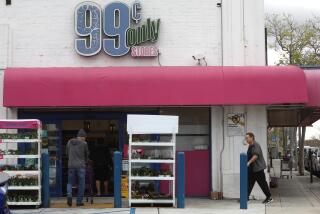Universal Music Was Boxed In on CD Prices by Big Retail Chains
- Share via
Universal Music Group’s top distribution executive, Jim Urie, began sketching out his plan to slash CD prices on the back of a Denny’s restaurant place mat as he returned from a Palm Springs vacation last Thanksgiving.
But the script for Universal -- whose decision to cut prices touched off tremors throughout the music industry this week -- may have been written well before then. Indeed, pressure has been building for industrywide price reductions since big-box retailers such as Best Buy Co., Target Corp. and Wal-Mart Stores Inc. began elbowing their way into the music business a decade ago with deep discounts on CDs.
Such mass merchants, while putting a squeeze on traditional record stores, account for some 50% of U.S. music sales. That’s up from 33% in the mid-1990s, according to estimates by industry insiders.
Universal executives downplay the notion that giant discounters directly forced the world’s largest record label to lower the wholesale price of most CDs by 25% and the suggested retail price by as much as 32%. But it was certainly more than coincidence that the amount Universal suggests consumers will now pay for its CDs -- around $10 -- is the same one that has become common in the weekly circulars distributed by big chains such as Best Buy.
Urie acknowledged that big-box-style prices had clearly struck a chord with music fans.
“When I was a kid, we identified ourselves by what bands we liked,” he said. “Now, in addition to that, kids identify themselves by how they consume music. ‘I put it on my iPod.’ ‘I take it from Kazaa.’ They talk about that. No kid wants to say, ‘I shop at Joe’s Expensive Records and pay $16.’ It was time to address that.”
The Vivendi Universal unit, whose labels include Interscope and Island Def Jam, sees its new pricing policy as a way to stem online piracy and revive flagging sales. Executives said consumers’ response to the price cuts was so positive Thursday that e-mails applauding the move poured into the company.
But what the tactic will mean for others -- from store owners to rival record labels -- is much muddier.
Even within Universal, executives hotly debated just what the new pricing scheme would mean for the economic fundamentals of their business. If prices were set so low, some suggested, marketing budgets might have to be trimmed accordingly. Others have raised the possibility of saving money by limiting the number of songs that artists could put on CDs.
Some predicted that Universal’s prime competitors -- AOL Time Warner Inc.’s Warner Music Group, Sony Corp.’s Sony Music Entertainment, Bertelsmann’s BMG and EMI Group -- would have little choice but to fall in line behind the industry leader.
“I bet that by the end of the month, every other major label will be on board” with similar price cuts, said artist manager Steve Rennie, a former Sony Music executive.
On Thursday, however, they kept their distance from Universal’s pricing strategy. “We’re always looking at our pricing policy, but we have no specific plans to do something similar at this time,” Warner Music said. The other three declined to comment, though industry sources said some feared that Universal had taken too radical a step -- one that threatened to accelerate the downward spiral the record business finds itself in.
Retailers, meanwhile, expressed mixed feelings.
Some smaller independent record stores have contended previously that the labels hurt them by often favoring the big-box chains with inordinate fees, subsidies and discounts. Last month, several small merchants sued Best Buy, alleging that it was the beneficiary of such special treatment -- and was thereby able to artificially hold down its retail prices. Best Buy has denied wrongdoing.
Part of Universal’s plan calls for the elimination of so-called positioning fees and cooperative advertising, in which the label subsidizes retailers’ marketing efforts. Everybody -- from Wal-Mart to the shop on the corner -- will now get the same wholesale price, no side deals attached.
“It levels the playing field,” said one music industry veteran who was briefed on the new Universal system, which is set to go into effect next month. “It’s simpler and fairer for everyone.”
Yet at the same time, some independent store owners expressed concerns.
To obtain the 25% wholesale price reduction, Universal is demanding that retailers guarantee the record company a quarter of their overall bin space and a big chunk of their promotions. Those terms are “totally impossible” to meet, Don Van Cleave, the president of a coalition of about 70 independent stores, groused Thursday in a letter circulated on a music industry Web site. “The very nature of a store being ‘independent’ is that they choose what to promote based on customer tastes and not necessarily label priorities.”
More broadly, some retail experts believe that the new pricing scheme will hasten the closure of many smaller stores, which already are suffering from razor-thin profit margins.
For their part, the big-box stores seem less ambivalent about Universal’s gambit.
Up until now, they’ve sold many of their CDs at a loss; the idea was to draw customers into their outlets to purchase bigger-ticket items such as electronic equipment and appliances. Thanks to Universal’s paring of wholesale rates, they can look forward to selling CDs for the same $10 or so they always have -- and yet manage to turn a profit.
Jason Miller, singer of rock band Godhead, thinks it’s the perfect price point.
Miller asked his label, Reality Entertainment, to cut the price of his new CD to $9.99 before it was released this summer. Reality executives had been prepared to sell the album for about $18 but agreed to lower the price to $15 and said stores are now selling it for about $13.
“Everyone has a sort of price in their own head of what they’re willing to spend,” Miller said. “I’ll go to Target or Wal-Mart when I’m on the road. It’s weird how people’s brains work. If you see ‘$9.99,’ it’s a different ballpark. You can buy a DVD for $9.99 in some cases. And a CD is $15? Where’s the value in that?”
*
Times staff writer Jon Healey contributed to this report.
More to Read
The biggest entertainment stories
Get our big stories about Hollywood, film, television, music, arts, culture and more right in your inbox as soon as they publish.
You may occasionally receive promotional content from the Los Angeles Times.










